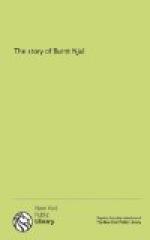These men were no idlers. They worked hard, and all, high and low, worked. In no land does the dignity of labour stand out so boldly. The greatest chiefs sow and reap, and drive their sheep, like Glum, the Speaker’s brother, from the fells. The mightiest warriors were the handiest carpenters and smiths. Gisli Sur’s son knew every corner of his foeman’s house, because he had built it with his own hands while they were good friends. Njal’s sons are busy at armourer’s work, like the sons of the mythical Ragnar before them, when the news comes to them that Sigmund has made a mock of them in his songs. Gunnar sows his corn with his arms by his side, when Otkell rides over him; and Hauskuld the Whiteness priest is doing the same work when he is slain. To do something, and to do it well, was the Icelander’s aim in life, and in no land does laziness like that of Thorkell meet with such well deserved reproach. They were early risers and went early to bed, though they could sit up late if need were. They thought nothing of long rides before they broke their fast. Their first meal was at about seven o’clock, and though they may have taken a morsel of food during the day, we hear of no other regular daily meal till evening, when between seven and eight again they had supper. While the men laboured on the farm or in the smithy, threw nets for fish in the teeming lakes and rivers, or were otherwise at work during the day, the women, and the housewife, or mistress of the house, at their head, made ready the food for the meals, carded wool, and sewed or wove or span. At meal-time the food seems to have been set on the board by the women, who waited on the men, and at great feasts, such as Gunnar’s wedding, the wives of his nearest kinsmen, and of his dearest friend, Thorhillda Skaldtongue, Thrain’s wife, and Bergthora, Njal’s wife, went about from board to board waiting on the guests.
In everyday life they were a simple sober people, early to bed and early to rise—ever struggling with the rigour of the climate. On great occasions, as at the Yule feasts in honour of the gods, held at the temples, or at “arvel,” “heir-ale,” feasts, when heirs drank themselves into their father’s land and goods, or at the autumn feasts, which friends and kinsmen gave to one another, there was no doubt great mirth and jollity, much eating and hard drinking of mead and fresh-brewed ale; but these drinks are not of a very heady kind, and one glass of spirits in our days would send a man farther on the road to drunkenness than many a horn of foaming mead. They were by no means that race of drunkards and hard livers which some have seen fit to call them.




